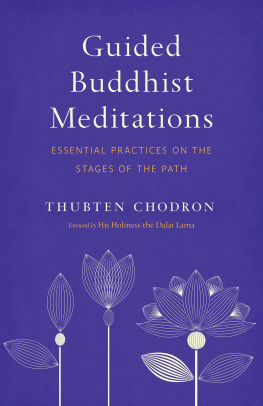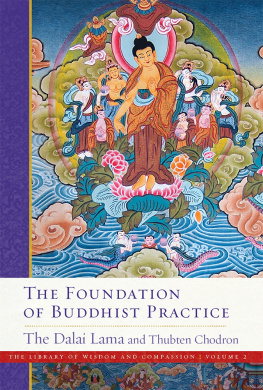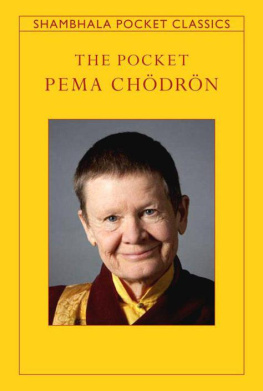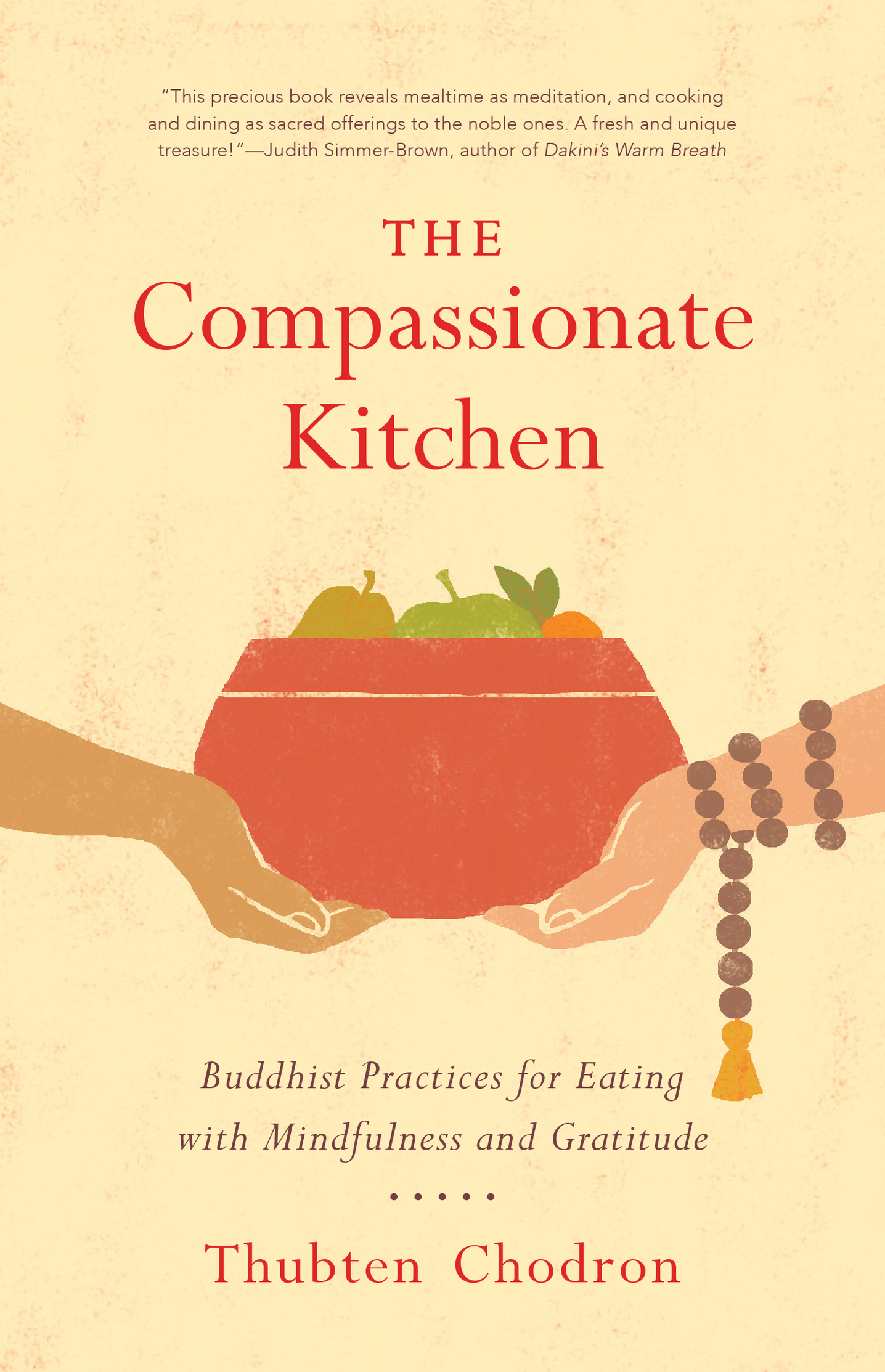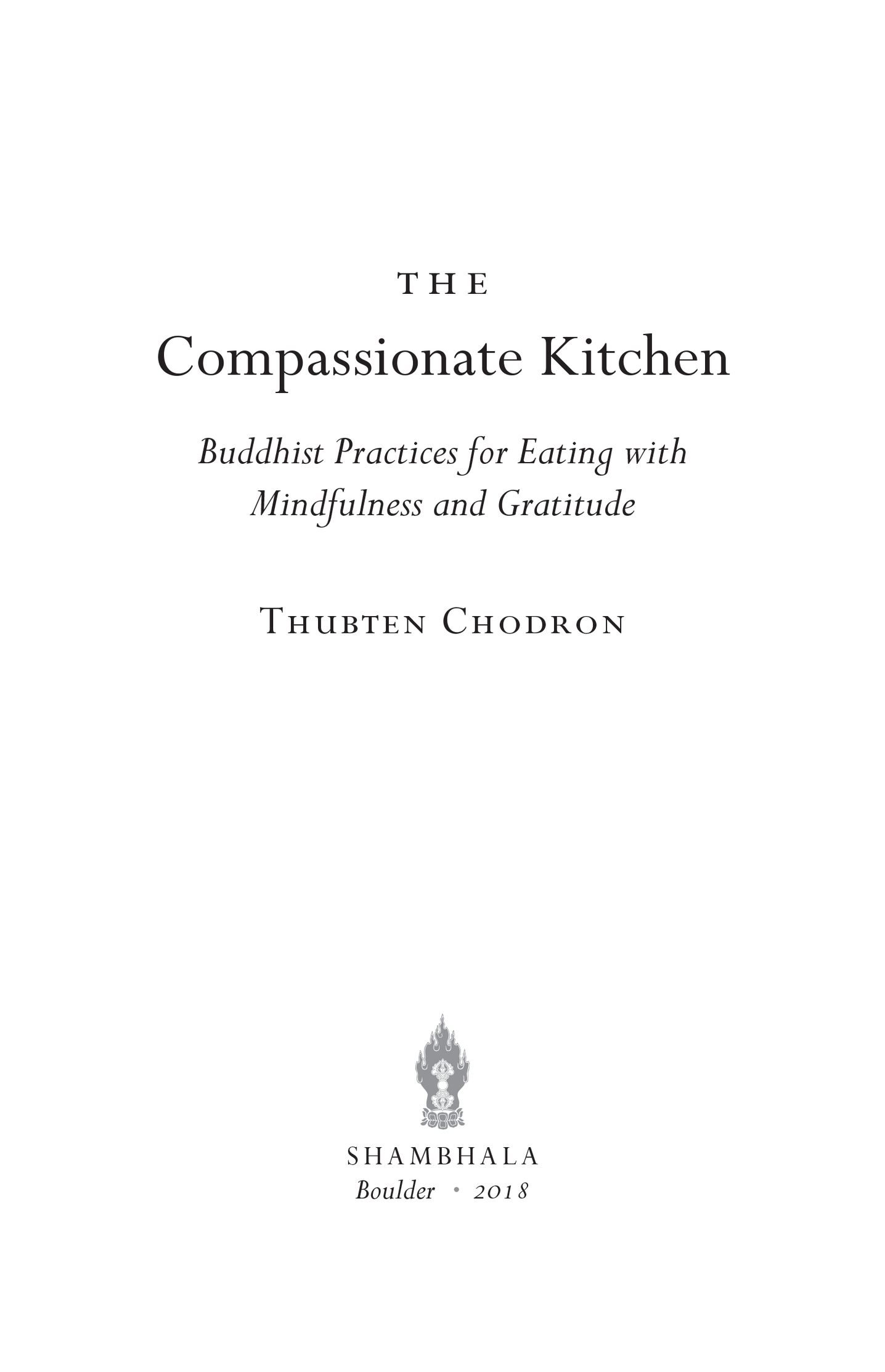Contents
A LSO BY T HUBTEN C HODRON
Approaching the Buddhist Path
(with the Dalai Lama)
Buddhism: One Teacher, Many Traditions
(with the Dalai Lama)
Buddhism for Beginners
Choosing Simplicity (ed.)
Cultivating a Compassionate Heart
Dont Believe Everything You Think
The Foundation of Buddhist Practice
(with the Dalai Lama)
Good Karma
How to Free Your Mind
An Open-Hearted Life
(with Dr. Russell Kolts)
Open Heart, Clear Mind
Practical Ethics and Profound Emptiness (ed.)
Taming the Mind
Transforming Adversity into Joy and Courage (ed.)
Working with Anger
Shambhala Publications, Inc.
4720 Walnut Street
Boulder, Colorado 80301
www.shambhala.com
2018 by Bhiksuni Thubten Chodron
All rights reserved. No part of this book may be reproduced in any form or by any means, electronic or mechanical, including photocopying, recording, or by any information storage and retrieval system, without permission in writing from the publisher.
eBook design adapted from printed book design by Steve Dyer
Cover art: Gwenda Kaczor/Marlena Agency
L IBRARY OF C ONGRESS C ATALOGING - IN -P UBLICATION D ATA
Names: Thubten Chodron, 1950 author.
Title: The compassionate kitchen: Buddhist practices for eating with mindfulness and gratitude / Bhiksuni Thubten Chodron.
Description: First Edition. | Boulder: Shambhala, 2018. | Includes bibliographical references.
Identifiers: LCCN 2018002243 | ISBN 9781611806342 (pbk.: alk. paper)
eISBN 9780834841710
Subjects: LCSH : FoodReligious aspectsBuddhism.
Classification: LCC BQ4570.F6 T48 2018 | DDC 294.3/4446dc23
LC record available at https://lccn.loc.gov/2018002243
v5.3.2
a
CONTENTS
PREFACE
F OOD NOURISHES our body and is indispensable for good health. Likewise, reflection and meditation nourish us spiritually. Along with receiving teachings and offering service to others, reflecting on the Dharma is essential for our spiritual health. This book is about combining spiritual and physical nourishment to create healthy, happy, and peaceful lives.
A Brief Introduction to Buddhism
Since some readers may be new to Buddhism, a brief introduction is in line. Buddhism began with the awakening of Shakyamuni Buddha in India approximately twenty-five centuries ago. It is based on the idea that all sentient beings (sattvas) want happiness, not suffering, but our approach to creating the causes for happiness is mistaken and so we often wind up experiencing unsatisfactory conditions instead. Each of us sentient beings has great potential our Buddha nature to make our lives meaningful and to bring about happiness for ourselves and others, but we are largely unaware of this hidden treasure inside our minds.
The basic framework of Buddhism centers on the four truths: unsatisfactory conditions (duhkha), their origin, their cessation, and the path to the cessation of all unsatisfactory conditions. Unsatisfactory conditions include aging, sickness, death, being separated from what is dear to us, not getting what we want, and disappointment in the long term even when things go the way we want in the short term. The origins of this situation lie principally in our own minds: they are the three poisons of ignorance that misapprehends the nature of reality; clinging attachment that is greedy and self-centered; and anger that wants to harm those who cause us harm or interfere with our happiness.
Since ignorance is erroneous, it can be counteracted by the wisdom that correctly realizes reality. Cultivating this wisdom is the core of the path, but other emotions and views need to be cultivated as well, such as ethical conduct that abandons harming others, the determination to be free from the cycle of constantly recurring problems called cyclic existence, love that wishes all sentient beings to have happiness and its causes, compassion that wishes them to be free of suffering and its causes, and meditative concentration that can focus one-pointedly on virtuous objects. Bringing about this internal transformation in our minds and hearts requires learning, reflection, meditation, and, of course, practice and time.
The Buddhist path is open for everyone to follow. Most Buddhists are lay practitioners people with families and jobsbut some choose to become monastics who take more ethical precepts and devote their lives to the Dharma, the Buddhas teachings. Many monastics live in monasteries Sravasti Abbey is one of them where we not only study, practice, and teach the Dharma but also serve society. We invite guests to come and practice with us.
How This Book Came About
I have been a Buddhist nun since 1977 and have eaten literally tons of food since then. In those years, I have lived in a variety of situations sometimes residing in Dharma centers, at times staying with families or living alone, and at other times abiding in a monastery. In all these settings, one constant practice has been a brief contemplation before eating and the recitation of verses that transform my attitude toward eating.
Sravasti Abbey, where Ive lived since 2003, is a monastery in eastern Washington State. It is home to a residential monastic community as well as lay trainees. We hold many events, courses, and retreats in which we are joined by guests from all over the world. Of course, we all eat together. One of the first things guests learn is our contemplation before meals and the offering of food. Almost everyone comments that this practice slows them down and makes them more mindful of why and how they eat. It also increases their awareness of the kindness of others as well as the numerous causes and conditions that must come together for a meal to occur. Many retreatants and guests have brought the practice of offering their food back to their homes and found that it changed the quality of their families mealtimes.
Our life at the Abbey is based on communal values, all of which in one way or another can be related to food. We cherish the environment and the beings we share it with, and we work to counteract consumerism, pollution, and waste. Gender equality is important to us, as are ethical conduct and generosity. Consideration of and respect for others are essential, and we value nonharmfulness, gratitude, humility, rejoicing at others success and happiness, making amends for our misdeeds, and practicing forgiveness. Our most important value is compassion. Articulating these values, I could write a chapter about each one and how it relates to food. If you are so inclined, pause for a minute and think about this, making examples of how to implement these values in your consumption of food.
At the request of Abbey residents and guests, in May and June of 2016, I gave a series of talks about nourishing our minds while nourishing our bodies. These talks were given just before lunch, like all our Bodhisattvas Breakfast Corner (BBC) talks. (Years ago, the talks were given before breakfast. We later moved them to just before lunch, but the original title remains.) The talks were transcribed and edited and additional material was added to form this book. You can listen to the original talks online at https://thubtenchodron.org/series/buddha-at-my-table/.



